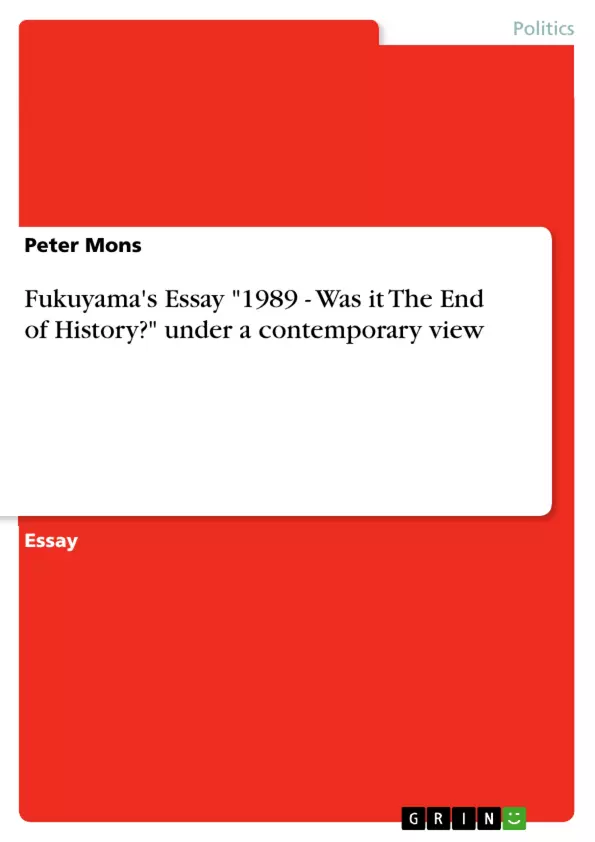Francis Fukuyama’s published essay “The End of History?” in “The National Interest'' in summer 1989, marked the beginning for one of the most controversial debates in contemporary historical philosophy. Just weeks before the fall of the Berlin Wall, Francis Fukuyama stated that liberal democracies showed their systematic superiority to monarchism, facism and finally in 1989 to communism. Fukuyama comes to the conclusion that democracy would be the end of human’s ideological evolution and therefore be its definite governmental system. In his understanding had the end of history just begun...
Inhaltsverzeichnis (Table of Contents)
- 1989 - Was It The End of History?
- Fukuyama's Essay Today
- The End of History?
- The Hegelian-Marxist Understanding of History
- Democracy as the Final Form of Human Ideological Evolution
- The Victory of Liberal Markets and Democratic Values
- Recognition and the Desire for Success
- The Potential for Social Unrest in Capitalism
- Disruptive Factors for Democracies: Religion and Nationalism
- The End of International Conflict?
- National Identity and the Need for a Cohesive Nationhood
- The Cradle of the Western Bourgeois Society
- Liberal Economies and Democratic Values
- The Case of Singapore
- The End of History and the Future of Democracy
Zielsetzung und Themenschwerpunkte (Objectives and Key Themes)
This essay examines Francis Fukuyama's 1989 essay, “The End of History?” and its enduring relevance in the context of contemporary global politics. It analyzes Fukuyama's arguments about the triumph of liberal democracy and market economies as the culmination of human ideological evolution.
- The Hegelian-Marxist understanding of history as a progressive process
- The rise and fall of various political systems, including communism, fascism, and monarchy
- The role of personal recognition and social equality in the functioning of democracies
- The challenges faced by democracies in the 21st century, including nationalism, religious extremism, and economic inequality
- The potential for alternative systems, like the Singaporean model, to emerge and challenge liberal democracy
Zusammenfassung der Kapitel (Chapter Summaries)
- Fukuyama's essay, "The End of History?", argued that liberal democracies had proven their systematic superiority to other political systems, culminating in the demise of communism and the rise of democratic values and market economies. He posits that this marked the end of human ideological evolution and the beginning of a new era of history.
- Fukuyama draws on the Hegelian-Marxist concept of history as a progressive and evolutionary process, emphasizing that democracy has emerged as the most effective and efficient system for achieving human recognition and social welfare. He acknowledges that history is not without setbacks and challenges, but ultimately, he sees liberal democracy as the dominant and inevitable force in the world.
- The essay explores the potential threats to democratic systems, including the rise of nationalism and religious extremism. Fukuyama acknowledges the presence of social and economic inequality, but he maintains that democratic systems can address these issues through internal reform and adaptation. He also examines the case of Singapore, a successful autocratic state, which raises questions about the long-term viability of democracy as the only acceptable system.
Schlüsselwörter (Keywords)
The main keywords and focus topics of this essay revolve around the enduring relevance of Francis Fukuyama's "The End of History?", exploring the interplay between liberalism, democracy, capitalism, nationalism, and the potential for alternative political and economic models.
Frequently Asked Questions
What is the main thesis of Fukuyama's "The End of History?"
Fukuyama argues that liberal democracy and market economies represent the final form of human ideological evolution and the ultimate governmental system.
Which political systems did Fukuyama consider inferior to democracy?
He stated that liberal democracy showed systematic superiority over monarchism, fascism, and communism.
How does Fukuyama view the role of "recognition"?
Following a Hegelian-Marxist understanding, he sees the desire for personal recognition and success as a driving force that is best fulfilled within a democratic framework.
What are the modern challenges to Fukuyama's theory?
Current challenges include the rise of nationalism, religious extremism, and economic inequality within capitalist systems.
Does Fukuyama acknowledge alternative political models?
Yes, the essay examines models like the Singaporean system, which raises questions about whether democracy is the only viable path to success.
What is the significance of the year 1989 in this context?
The year 1989 marked the fall of the Berlin Wall and the collapse of communism, which Fukuyama saw as the final victory for liberal democratic values.
- Citar trabajo
- Peter Mons (Autor), 2021, Fukuyama's Essay "1989 - Was it The End of History?" under a contemporary view, Múnich, GRIN Verlag, https://www.grin.com/document/991292



